
But What About the Boys? Meet the Guys Who Started a Feminist Club at their All Male High School
Kiku Gross is a writer, punk rocker, and general nuisance from the Central Valley of California. If she’s being totally honest, she’s made a name for herself in the advertising industry by yelling on the internet, and she’s kind of proud of it. You may recognize her from the 3% VOICES Blog, but you probably recognize her from Twitter. When she’s not busy writing words, she enjoys drinking coffee, listening to loud music, and taking naps.
Moderator: Ben Gordon, High School Senior and Community Service Advocate
Speakers: Matias Benitez and Matt Chen, Co-Founders, HeForShe Club
So, two teenage boys from an all-boys Manhattan private school decide they’re going to start a feminist club. No, this isn’t the beginning of a bad joke.
More specifically, two teenage boys who attend Regis High School, “a private Jesuit university-preparatory school for Roman Catholic young men” decided that they were going to start a feminist club.
In September of 2017, Matias Benitez texted his friend, Matt Chen after talking to his sister about the feminist club at her school that, despite being a co-ed school, was still predominantly girls. What started as the sort of wacky “what if” that only teenage boys could entertain (“wouldn’t it be crazy if Regis had a feminist club?”) became the seeds of a movement that’s been featured in The Washington Post, Time, and of course, the Main Stage of the 2019 3% Conference.
Admittedly, I wasn’t exactly sold on the concept when I first heard about it. Not because I believe that cisgender boys can’t be feminists, nor because I believe that teenagers can’t care about legitimate social issues. But because as someone who’s only five years removed from being seventeen, I had to wonder exactly why these sweater vest wearing, private school attending, high-and-tight-haircut-having young men were so interested and, well, dedicated to running this HeForShe Club.
So, no, I wasn’t starting this panel in good faith, and yeah I do feel bad about that. But, in my defense, when I was that age, I knew plenty of kids who were part of social good clubs or started social good clubs in high school for the sole purpose of padding college applications. Between volunteering clubs, student government, Model UN, and yes, feminism clubs, there were plenty to go around at my regular old public school, and there was a (larger than I’d like to admit) part of me that was under the impression that this club was going to be no different.
If you know me, you know I have a long and hilarious track record of being shockingly and stunningly wrong.
This was another one of those times.

Moderated by the ever eloquent and charismatic Ben Gordon (I’ll reiterate here, thank God he isn’t a young Republican, otherwise, we’d be done for), this panel was not only surprising to me but wonderfully heartwarming. Coming from a part of California that is more “Red” and “White” than “Blue,” there was something really, really incredible about seeing a group of boys who were willing to be vulnerable, earnest and open (both with themselves and the audience).
One of my favorite things about these boys and this panel, aside from how much they really did seem to care about social justice (well, and the fact that they were all adorable and I wanted to keep them all in my pocket and feed them peanut butter), was how self-aware they came off, especially given how young they are, and how young they are in their activist careers.
"Decentering oneself from conversations is a skill that I work hard on every day."
Often, people who want to be allies and who want to help the cause mean well, but end up centering themselves more than the people they’re trying to help. Decentering oneself from conversations is a skill that I work hard on every day, but here these kids were, holding inter-school meetings with other feminist clubs (predominantly from all girls schools) for broader perspective, and saying things like “well, we didn’t actively publicize it [the HeForShe Club] because we didn’t really want to lift ourselves up at the expense of others.”
I think mostly what I was encouraged (and, admittedly, impressed) by was how much of a grasp these boys had on the nuances of social justice and change. They understood that sexism and gender inequality were no longer obvious and clear problems that could be easily targeted, but more insidious, grey-area issues that required examining of power structures, entire societal systems, and what the “status quo” was. They understood that they needed to be aware of their privilege and their biases and how that affected their everyday lives and work. And, they understood that sometimes, things don’t go the way you want them to.
“We can’t change everyone’s minds,” said Benitez, “but we try to.”
I mean, really. That’s more serenity from a teenage boy than you will ever see from me, a fully grown, adult woman.
And of course, these boys did their homework (what else would you expect from private school kids?), so they knew that they couldn’t come to this conference without a few actionable takeaways.
So what could we, the fully grown adults of The 3% Conference learn from some private schoolboys from Manhattan who started a feminist club at just 15 years old?
For as hard as it can be, we should engage with people who aren’t feminists, especially if we’re from a privileged group. These boys saw that there was a need for a feminist club at their all-boys school, and knew that they were going to have to be the people to convert their friends. Those of us who come from privileged groups (i.e. being cisgender, or straight, or white, etc.) are responsible for making our fellows better people.
Use your influence, no matter how small you think it is. Even one changed mind is better than none. Whether you’re a mother, a mentor, or just someone who has some friends, there’s no impact too small to help the cause. After all, these two teenage boys didn’t think their little club would be so important, but here I am writing about it!
Give boys more credit. Ok. Yeah. Guilty. Admittedly, I’m one of those people who assumes that boys probably aren’t interested in feminism. But every day I meet men who prove me wrong, and often, I come across boys like this who blow me out of the water (and are probably “better” feminists than I am). In the same way that feminism helps break stereotypes about women, it also aims to dismantle stereotypes about men, and I’m really glad that these boys and many other boys work hard to prove me wrong every single day.
As I approach my mid-twenties, I’m starting to move away from being “the youngest person in the room,” and I always wonder who I’m going to pass the torch to. And, if I’m being perfectly frank (do you expect me to be anything else at this point?) I worry about it.
But after this panel, I realized that I don’t have to worry about it. These kids (young adults, really) are better than I ever was at that age, and honestly, probably better than I am as an adult, right now. Both intelligent and deeply empathetic, I was so glad to see that our future was in capable hands. As long as our world doesn’t succumb to an impending ecological apocalypse, I can’t wait to see what these young men will do in their future.
Excelsior, boys!




